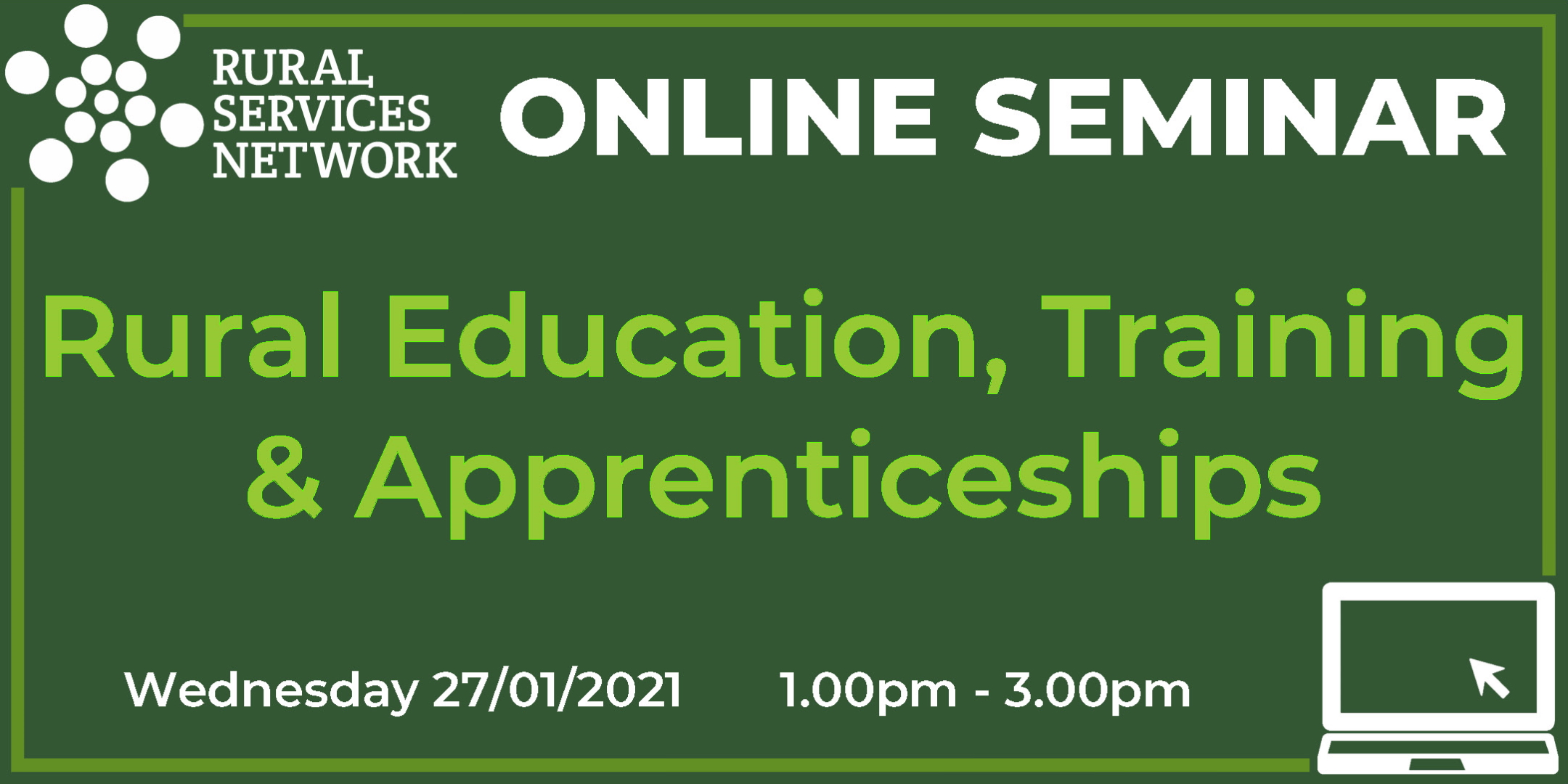T: 01822 851370 E: [email protected]
Visit RSN Survey about life in rural England to find out more.
27/01/2021 - RSN Seminar: Rural Education, Training & Apprenticeships
Date: 27th January 2021
Subject: Rural Rural Education, Training & Apprenticeships
Chair: Graham Biggs MBE, Chief Executive at Rural Services Network
- To download the Agenda for this seminar click here
- To download the Attendance and Apologies for this seminar click here
- To download the Learning Outcomes from this seminar click here
Speakers:
-
Nicola Coupe, School Improvement Adviser Strategic Lead and Leadership Recruitment at The Diocese of Salisbury
"Rural Teach First Partnership Initiative between Teach First and the Church of England Education Office and the Chartered College of Teaching"
- Download the presentation here
-
Dr Oliver Jenkin, Senior Career Development Consultant at CSW Group
"The role of CSW Group in supporting young people in rural areas to access employment and training in the South West"
- Download the presentation here
-
Claire Whitworth, Vice Principal FE at Hartpury College
"Land based training and education"
- Download the presentation here
Learning Outcomes:
Nicola Coupe, Diocese of Salisbury
- Rural Teaching Partnership has been launched between Teach First, Chartered College of Teaching and Church of England.
- The partnership will run in ten pilot regions across England and will see trainee teachers, trained by Teach First, start two-year placements with Church of England primary schools in September 2021.
- Aims to overcome issues of recruitment and retention in rural schools and give teachers the skills to teach in often smaller classes, and classes which contain a mixture of year groups.
- Part of the recruitment process includes consideration of the challenges relating to transport and cost of housing in rural areas.
Click here to see news article on Teacher Training on Rural Teaching Partnership[1]
Dr Oliver Jenkin, CSW Group
- A not-for-profit social enterprise offering information, guidance, and support to individuals as they move through different stages if their lives.
- Contracted by by the Local Authorities of Devon, Cornwall, Plymouth, Torbay and Somerset to provide services to encourage, enable or assist young people in effectively participating in education or training.
- Barriers facing young rural people:
Limited public transport:
- Impacts young people’s ability to access education, employment, training, medical appointments, and social opportunities. This in turn can adversely impact mental health.
- Ability to travel can be limited by geography, finances and ability to rely on friends/family for transport (the latter must fit this around work and other commitments).
- Difficulties accessing transport means young people often have to look for work in the immediate surroundings, often applying for what is available rather than what they are interested in.
- Some young people also lack the confidence to access public transport and may need support with this.
- CSW Group helping young people by providing Transitions Contract, Online innovations and Focus 5 (Consistent support to targeted groups of young people).
Claire Whitworth, Hartpury College
- Land based colleges provide wide range of courses and levels.
- Focus on resilience and confidence alongside practical skills development.
- Engage with industry and businesses to inform curriculum and ensure teaching is appropriate to the future skills needed by workforce.
- Close contacts with businesses to enable work experience and substantial industry placements which is vital to enable students to understand the industry.
- Hartpury focus on collaborative working enabled through Landex group of colleges.
- Future considerations include the Skills for Jobs White Paper, T Level changes in 2023 and increased focus on Climate Commission.
- Major issues with capital funding for colleges – insufficient funds to support all development needs.
Additional areas discussed in the seminar
- Transport and access are a big issue for young people in rural areas.
- Not just about young people (under 18) but those in their 20’s and older that are unskilled and have lost their employment through the pandemic. How can we try to support them to retrain and develop appropriate skills?
- Funding settlement for Further Education is vital.
- Rurality costs more
- ‘It’s a specific skill set to deliver teaching and services to rural communities, and we need to teach it, or we will lose it.’




